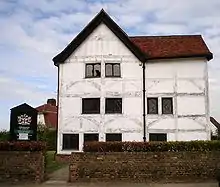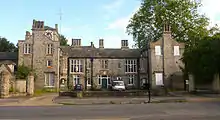Chingford
Chingford is a district in East London, located in the London Borough of Waltham Forest[2] and is situated 8.6 miles (13.8 km) northeast of Charing Cross. Historically a rural Essex parish, it gained urban district status in 1894, and between 1938 and 1965 formed the core of the Municipal Borough of Chingford. Chingford is close to the Essex border of Epping Forest District.[3][4] Chingford has a population of 66,211 as of 2011, represented by six electoral wards, which includes its sub-neighbourhoods such as Chingford Mount, Friday Hill and Highams Park.
| Chingford | |
|---|---|
_Chingford_-_geograph.org.uk_-_2638823.jpg.webp) Chingford Mount | |
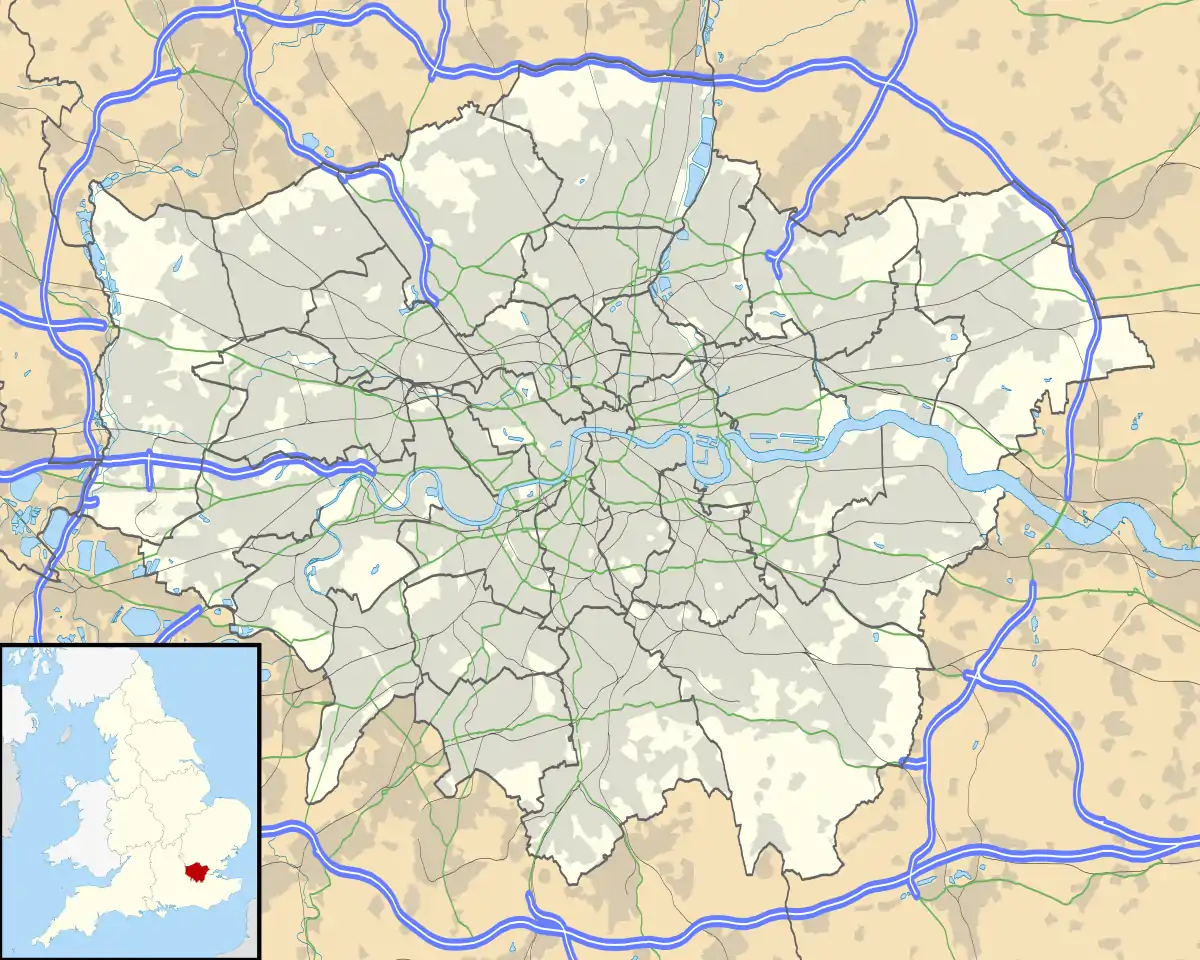 Chingford Location within Greater London | |
| Population | 66,211 (2011 Census)[1] |
| OS grid reference | TQ395945 |
| • Charing Cross | 10 mi (16 km) SW |
| London borough | |
| Ceremonial county | Greater London |
| Region | |
| Country | England |
| Sovereign state | United Kingdom |
| Post town | LONDON |
| Postcode district | E4 |
| Dialling code | 020 |
| Police | Metropolitan |
| Fire | London |
| Ambulance | London |
| UK Parliament | |
| London Assembly | |
It borders Sewardstone to the north, Woodford Green and Buckhurst Hill to the east and Walthamstow to the south. To the west lie William Girling and King George V reservoirs, known together as the Chingford Reservoirs, and the River Lea. Across these, Chingford is linked with Ponders End through the A110 Lea Valley Road, whilst South Chingford is linked with Edmonton through the A406 Lea Valley Viaduct. To the north and east lies Epping Forest, the most part of which is in Essex but is maintained by the City of London Corporation.[5]
Toponymy
The River Ching runs through the area, and the town of Chingford is close to a number of fords of that river. However, old maps and descriptions give a name for the settlement long before the river has a name and it is likely that the name of the river as "Ching" arose long after the settlement was named. The alternative view is that the ford crossed the Lea, and a location near Cook's Ferry has been suggested.[6]
The area of Chingford is referenced in the Doomsday book as "Cingefort" from 1066AD.[7] It is thought that, similarly to how Kingston upon Thames appears in Domesday Book of 1086AD as Chingestone and Chingetun(e), with ching being old English for the king, that Chingford could refer to the King's river, and Kings Ford. This idea is compounded by links to royalty using the area for hunting in centuries gone by, with Queen Elizabeth's Hunting Lodge[8] still standing in North Chingford.[9] Furthermore, there is evidence of King Harold Harefoot having lived in Chingford and the environs in the 11th century, a date which ties in with the Old English use of "Ching" for King.
Another suggested explanation by place name genealogists is that the settlement's name has its origin as "Shingly Ford"—that is, a ford over a waterway containing shingles.[10] However, the genealogists' assertion is likely to be incorrect, as the usage of the placename name "Cingefort" in the Doomsday book predates the coining of the word "Shingle." The earliest known usage of the Middle English word shingle is 1200AD and the word was not used to describe loose stones on a waterway until three centuries later in the 1500s.[11]
Landmarks
One notable local landmark is Queen Elizabeth's Hunting Lodge.[12] Originally called the Great Standing, it was built for King Henry VIII in 1543, and was used as a grandstand to watch the hunting of deer, although it has been heavily altered over time. The building is located on Chingford Plain within Epping Forest and is open to the public. The lodge is preserved under the Epping Forest Preservation Act.[13]
Originally a barn built in the mid-19th century, Butler's Retreat, a Grade II listed building, is one of the some remaining Victorian retreats within the forest. The building is adjacent to the Queen Elizabeth's Hunting Lodge and takes its name from the 1891 occupier John Butler. Retreats originally served non-alcoholic refreshments as part of the Temperance movement. After closing in 2009 the building was refurbished by the City of London Corporation and re-opened as a cafe in 2012.[14]
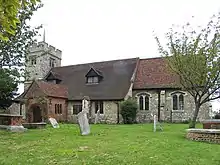
All Saints' Church in Chingford Mount (known locally as the Old Church) dates back to the 12th century. Directly opposite the church is Chingford Mount Cemetery, best known today as the burial place of the Kray family.[15]
Friday Hill House, Simmons Lane, off Friday Hill, dating from 1839, was a manor house built and owned by Robert Boothby Heathcote, who was both the lord of the manor and rector of the local church. It was he who paid for the building of the church of St Peter and St Paul in Chingford. He is buried in the Boothby family vault in All Saints' Churchyard (Chingford Old Church), Old Church Road. The vault was purchased by Robert Boothby (died 1733), who lived in the previous manor house. The present building has been used as a further education centre but was put up for sale in 2012.[16][17]
Pimp Hall Dovecote is situated in a green area at the bottom of Friday Hill and can be viewed by entering the Pimp Hall Nature Reserve. The dovecote, which had nesting space for 250 birds, belonged to Pimp Hall (originally Pympe's Hall), one of three manor houses around Chingford. In 1838 the estate was taken over and became part of the Chingford Earls estate. The farmhouse associated with it survived until just before World War II. This dovecote is depicted in the Millennium Heritage Mosaic on the front of Chingford Assembly Hall. It is the fourth item down on the left-hand side of the mosaic, also see the Key. There is a local legend telling how on one occasion Charles II was out hunting in Epping Forest and was caught in a snowstorm. He took shelter in Pimp Hall and was so delighted with the food offered him that he jocularly drew his sword and knighted the joint of beef declaring that it was now Sir Loin. Either this story caused the nearby pub on Friday Hill to be called "The Sirloin" or vice versa.
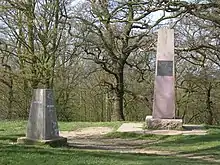
A granite obelisk at Pole Hill was erected in 1824 under the direction of the Astronomer Royal, the Rev. John Pond M.A., to mark true north for the telescopes of the Royal Observatory at Greenwich, south of the Thames. It was placed on high ground along the line of the Greenwich Meridian, but when this was recalibrated later in the 19th century, the obelisk was deemed to have been erected 19 feet (5.8 m) west of the revised meridian line. Today, an adjoining triangulation pillar marks the modern line.
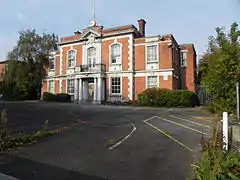
Chingford Town Hall, dating from 1929, is on The Ridgeway in Chingford. It has more recently been known as the Chingford Municipal Offices. The site was sold to property developers who built blocks of flats on the land and the town hall building was subsequently converted to apartments.[18][19]
Governance
Parliament
Chingford is within the Chingford and Woodford Green UK Parliament constituency, which consists of the six Chingford wards in the Borough of Waltham Forest and two wards in the Borough of Redbridge. Iain Duncan Smith has been the sitting MP since 1992.[20]
Former MPs include Norman Tebbit, Leah Manning, Stan Newens, and Winston Churchill (when Chingford was in the Epping constituency).
London
Chingford is part of the London Borough of Waltham Forest, which also includes the east London districts of Walthamstow, Leyton, and Leytonstone. Chingford consists of six council wards, namely:
- Chingford Green
- Endlebury
- Valley
- Larkswood
- Hatch Lane
- Hale End and Highams Park
Each ward is represented by three councillors; at present all of the councillors represent the Conservative Party except for two Labour ones in Valley and Hale End and Highams Park. The London Borough of Waltham Forest is presently controlled by the Labour party.
Chingford and Waltham Forest fall within the North East constituency of the London Assembly,[21] represented since 2004 by Jennette Arnold of the Labour party.[22]
When Chingford was a municipal borough, before 1965, its politics were dominated by the Chingford Ratepayers' Association, which was nominally independent, but against whom the Conservative Party did not field candidates.
Demography
As of the 2011 census, 86% of the population of Chingford Green ward, which covers the north of the area, was white (77% British, 7% Other, 2% Irish).[23] Endlebury ward, covering a central area, was 78% white (68% British, 8% Other, 2% Irish). 7% was black (3% African, 3% Caribbean, 1% Other).[24] Valley ward, covering south west Chingford, is the most culturally diverse, with just half the population identifying as White British.
Housing
Chingford was the location of one of the interwar London County Council cottage estates.
| Estate name | Area | No of dwellings | Population 1938 | Population density |
|---|---|---|---|---|
| Pre-1914 | ||||
| Norbury | 11 | 218 | 867 | 19.8 per acre (49/ha) |
| Old Oak | 32 | 736 | 3519 | 23 per acre (57/ha) |
| Totterdown Fields | 39 | 1262 | — | 32.4 per acre (80/ha) |
| Tower Gardens White Hart Lane | 98 | 783 | 5936 | 8 per acre (20/ha) |
| 1919–1923 | ||||
| Becontree | 2770 | 25769[lower-alpha 1] | 115652 | 9.3 per acre (23/ha) |
| Bellingham | 252 | 2673 | 12004 | 10.6 per acre (26/ha) |
| Castelnau | 51 | 644 | 2851 | 12.6 per acre (31/ha) |
| Dover House Estate Roehampton Estate | 147 | 1212 | 5383 | 8.2 per acre (20/ha) |
| 1924–1933 | ||||
| Downham | 600 | 7096 | 30032 | 11.8 per acre (29/ha) |
| Mottingham | 202 | 2337 | 9009 | 11.6 per acre (29/ha) |
| St Helier | 825 | 9068 | 39877 | 11 per acre (27/ha) |
| Watling | 386 | 4034 | 19110 | 10.5 per acre (26/ha) |
| Wormholt | 68 | 783 | 4078 | 11.5 per acre (28/ha) |
| 1934–1939 | ||||
| Chingford[lower-alpha 2] | 217 | 1540 | — | 7.1 per acre (18/ha) |
| Hanwell (Ealing) | 140 | 1587 | 6732 | 11.3 per acre (28/ha) |
| Headstone Lane | 142 | n.a | 5000 | |
| Kenmore Park | 58 | 654 | 2078 | 11.3 per acre (28/ha) |
| Thornhill (Royal Borough of Greenwich) | 21 | 380 | 1598 | 18.1 per acre (45/ha) |
| Whitefoot Lane (Downham) | 49 | n.a | n.a. | |
| Source:*Yelling, J.A. (1995). "Banishing London's slums: The interwar cottage estates" (PDF). Transactions. London and Middlesex Archeological Society. 46: 167–173. Retrieved 19 December 2016. Quotes: Rubinstein, 1991, Just like the country. |
|
Local sport teams
- Chingford's oldest football club is Egbertian FC,[25] formerly Old Egbertian FC, which was started by former pupils of St Egbert's College, Chingford. The club was formed in 1928 and is affiliated to the Amateur Football Alliance (AFA). The club plays in the Amateur Football Combination.
- Ridgeway Rovers Youth Football Club is a local club in Chingford East London. Notable former players include David Beckham, Andros Townsend, and Harry Kane.[26]
- Chingford Rugby Club was also founded in 1928, and its ground is at Waltham Way, Chingford.[27]
- Chingford Cricket Club is located on Forest Side, but the entrance to the ground is on Kimberley Way. It is believed to have been founded in 1884.[28] The club plays in The Shepherd Neame Essex League[29] and the 1st team were promoted to the Premier League for the 2013 season.
- Chingford Town Football Club was re-established in 2018 by local schoolboys and competes with the local non-league teams of Essex.
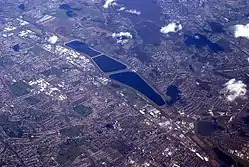
- King George Sailing Club was founded in the 1970s to provide dinghy sailing and windsurfing on the largest and best sailing water in the north and east of London. The club enjoys facilities both on and off the water and has an active membership engaged in racing, learning to sail, casual sailing, and windsurfing. In recognition of its good facilities and encouragement of youth sailing, the Royal Yachting Association has awarded the club Volvo Champion Club status.[30]
Local districts
Transport

Chingford is served by Chingford railway station which is the terminus of a London Overground branch line from Liverpool Street station in the City of London. There is also a station at Highams Park. Chingford lost its rail link to Stratford with the removal of the 500 m length of track known as the Hall Farm Curve in 1970, and there have been campaigns for its reinstatement
London Buses provide routes linking Chingford to Walthamstow, Loughton, Leytonstone, Stratford, Ilford, Potters Bar and Turnpike Lane. On Saturdays Essex County Council route 505 runs to Harlow. The town is also served by the N26 Night bus from Trafalgar Square.
Education
Chingford secondary schools include:
Notable people
- Charles Alcock, founding father of the Football Association and creator of the FA Cup, moved to Chingford with his family when he was young.[31]
- Dame Louisa Aldrich-Blake, notable surgeon and pioneer in medical education for women, was born in Chingford.[32]
- The footballer David Beckham OBE grew up in Chingford from age three.[33][34][35] He was educated at the Chingford Foundation School and also Chase Lane Primary School[36] and played football for Ridgeway Rovers F.C.,[37][38] a local side.
- Winston Churchill was MP for Epping, a defunct constituency that included Chingford, from October 1924 to July 1945.[39]
- Alan Davies, stand-up comedian and regular guest on the quiz show QI, grew up in Chingford.[40]
- Paul Di'Anno, former lead singer of heavy metal band Iron Maiden, was born and grew up in Chingford.[41]
- Dwight Gayle, current Newcastle United striker, is from Chingford.
- Durrty Goodz, a well-known grime musician, is from Chingford.
- Peter Greenaway, film director, grew up in Chingford.
- Steve Hillage, guitarist, is from Chingford.
- Harry Kane, Tottenham Hotspur and England striker, is from Chingford and attended Chingford Foundation School.[42][43][44][45]
- Jony Ive, Apple Chief Design Officer, was born in Chingford.[46]
- The Kray twins, who dominated the London gangland scene during the 1960s, are buried in Chingford Mount Cemetery.[15]
- John Lloyd, co-founder of the international design consultancy Lloyd Northover, grew up in Chingford and lived there from 1948 to 1970.
- Professor Alan Mozley, zoologist, was born in Chingford.
- Graeme Norgate, composer of video game music, was born and grew up in Chingford.
- Michael Nyman, composer of minimalist music, notably film scores, grew up in Chingford.[47]
- Leslie Phillips, comedy star of the Carry On films, lived in Chingford.[48]
- Faiza Shaheen Economist and Labour Party Prospective Parliamentary Candidate for Chingford and Woodford Green. Director of left wing think-tank CLASS.
- Teddy Sheringham, former England, Tottenham Hotspur F.C., and Manchester United F.C. player
- Iain Duncan Smith has been (as of 2020) the Conservative MP for Chingford and Woodford Green since 1992.[49]
- John Sitton, former Chelsea footballer and Leyton Orient manager, lives in Chingford.[50]
- Kaikhosru Shapurji Sorabji, composer and pianist, was born in Chingford.[51]
- Andros Townsend, Crystal Palace and England midfielder, attended Rush Croft Sports College and grew up in Chingford.
- Michelene Wandor, feminist poet and critic, went to school in Chingford.
References
- Chingford is made up of 6 wards in the London Borough of Waltham Forest: Chingford Green, Endlebury, Hale End and Highams Park, Hatch Lane, Larkswood, and Valley. "Archived copy". Archived from the original on 22 February 2014. Retrieved 9 June 2014.CS1 maint: archived copy as title (link)
- "London's Places" (PDF). Greater London Authority. Archived from the original (PDF) on 6 September 2015. Retrieved 24 October 2015.
- "History of Chingford, in Waltham Forest and Essex". University Of Portsmouth and others. 2009. Retrieved 23 June 2012.
- "The parish and borough of Chingford". University of London & History of Parliament Trust. 2012. Retrieved 23 June 2012.
- "Epping Forest". cityoflondon.gov.uk. 10 November 2011. Archived from the original on 11 January 2012. Retrieved 16 January 2012.
- The Place Names of Essex, by PH Reaney, English Place Name Sciety, Volume 12 p19
- "Chingford Doomsday Book entry". Government National Archives. Retrieved 8 September 2017.
- "Queen Elizabeth's Hunting Lodge". Cityoflondon.gov.uk. 16 December 2010. Archived from the original on 12 June 2011. Retrieved 14 December 2011.
- "cityoflondon.gov.uk". Archived from the original on 12 August 2013. Retrieved 6 August 2013.
- "Chingford's Free Art and History". exploringeastlondon.co.uk. Retrieved 16 January 2012.
- "Etymology of the word Shingle". Etymology Online. Retrieved 7 September 2017.
- "Queen Elizabeth's Hunting Lodge". Cityoflondon.gov.uk. 16 December 2010. Archived from the original on 12 June 2011. Retrieved 14 December 2011.
- Chisholm, Hugh, ed. (1911). . Encyclopædia Britannica. 6 (11th ed.). Cambridge University Press. p. 233.
- City of London- Butler's Retreat Retrieved 25 February 2013
- "Kray funeral date set". BBC News. 3 October 2000. Retrieved 10 May 2009.
- "Waltham Forest Council, Friday Hill House Disposal". Archived from the original on 5 July 2012. Retrieved 19 November 2016.
- "Waltham Forest Council, Friday Hill House Sale Particulars" (PDF). Archived from the original (PDF) on 9 July 2012. Retrieved 19 November 2016.
- "Waltham Forest Council, Chingford Municipal Offices disposal". Archived from the original on 15 June 2012. Retrieved 19 November 2016.
- "Gilmartin Ley, The Old Town Hall, Chingford, London, E4". Archived from the original on 31 July 2012. Retrieved 14 September 2017.
- "Rt Hon Iain Duncan Smith MP". UK Parliament.
- "Census 2011: London Assembly Constituency Profiles". London Datastore. GLA Intelligence Unit. 2013. p. 47.
- "Assembly Members". Mayor of London and London Assembly. Retrieved 4 February 2021.
- "Chingford Green". UK Census Data. 2011. Archived from the original on 27 October 2017.
- "Endlebury". UK Census Data. 2011. Archived from the original on 27 October 2017.
- Egbertian FC Archived 8 February 2011 at the Wayback Machine Retrieved 27 February 2013
- "Team London - Ridgeway Rovers Football Club". volunteerteam.london.gov.uk.
- "Home | Chingford Rugby Club". Chingfordrugby.co.uk. 10 December 2011. Retrieved 14 December 2011.
- "Chingford Cricket Club : history". www.chingfordcricketclub.co.uk. Archived from the original on 14 July 2014. Retrieved 24 March 2013.
- "The Shepherd Neame Essex League". Essex Cricket.
- King George Sailing Club Retrieved 27 February 2013
- "England Football Online".
- "Blake, Dame Louisa Brandreth Aldrich- (1865–1925), surgeon". Oxford Dictionary of National Biography (online ed.). Oxford University Press. 23 September 2004. doi:10.1093/ref:odnb/30367. Retrieved 16 February 2019. (Subscription or UK public library membership required.)
- "BBC Radio 4 - Desert Island Discs, David Beckham". Desert Island Discs. 3 February 2017. Retrieved 16 March 2019.
- Culpepper, Chuck (9 July 2007). "Beckham - Working-class boy to Man U". Los Angeles Times. Retrieved 9 September 2008.
- "Becks opens up about Chingford on Desert Island Discs". East London and West Essex Guardian Series. Retrieved 8 December 2020.
- "American Idols". W magazine. 1 August 2007. Archived from the original on 14 February 2009. Retrieved 24 February 2009.
- Beckham at Ridgeway Rovers Retrieved 27 February 2013
- The FA - Becks' Brimsdown boost, article from Friday, 24 September 2004 Archived 11 October 2004 at Archive.today, accessed 7 July 2007
- "List of MPs". Archived from the original on 29 November 2017. Retrieved 10 May 2009.
- Pearce, Garth (11 July 2008). "On the move: Alan Davies". The Sunday Times. London. Retrieved 10 May 2009.
- "Metal-archives.com". Metal-archives.com. Archived from the original on 18 August 2010. Retrieved 14 December 2011.
- "Zero to 100 | By Harry Kane". The Players' Tribune. Retrieved 8 December 2020.
- "Hall of Fame". CHINGFORD FOUNDATION SCHOOL PE Department. 18 February 2015. Retrieved 8 December 2020.
- "One day I'll play for England: London schoolboy's dream is about to". Evening Standard. 27 March 2015. Retrieved 8 December 2020.
- Molyneaux, Ian (15 November 2020). "The London school where David Beckham and an Eastenders star were pupils". MyLondon. Retrieved 8 December 2020.
- "Jony Ive | Biography, Apple, & Facts". Encyclopedia Britannica. Retrieved 28 January 2021.
- Siôn, Pwyll ap (10 June 2017). The Music of Michael Nyman: Texts, Contexts and Intertexts. Ashgate Publishing, Ltd. ISBN 9781859282106 – via Google Books.
- Moyes, Johnathon (27 June 2007). "Ex-pupil Phillips opens old school". Waltham Forest Guardian. Retrieved 10 May 2009.
- "Iain Duncan Smith, MP for Chingford and Woodford Green". www.iainduncansmith.org.uk. Retrieved 26 December 2019.
- "John Sitton". IMDb. Retrieved 26 December 2019.
- "Kaikhosru Shapurji Sorabji | British composer". Encyclopedia Britannica. Retrieved 26 December 2019.
External links
- London's Railways
- Queen Elizabeth's Hunting Lodge
- The Chingford War Memorial Project
- Archival material relating to Chingford listed at the UK National Register of Archives
- Images of Chingford at the English Heritage Archive
- Chingford Parish (St Peter & St Paul Church; Chingford Old Church)
- St Edmund's Parish Church, Chingford
- St Anne's Parish Church, Chingford
| Wikimedia Commons has media related to Chingford. |
